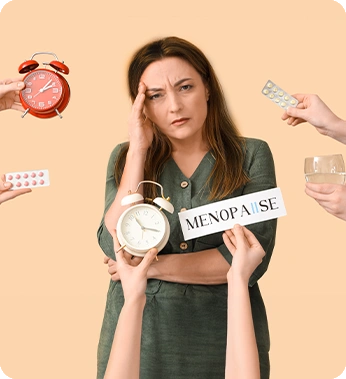Menopause – Natural & Personalised Relief
Helping You Live Better through Menopause – Naturally
Book your Appointment
Menopause marks the end of a woman’s menstrual cycles, typically occurring between ages 45–55 (with average onset around 47–49 in India). It brings a wide range of symptoms including hot flashes, abrupt mood changes, vaginal and intimate dryness, sleep disturbances, weight gain, body aches, fatigue, and loss of energy , all of which can deeply impact emotional well-being, relationships, and everyday life
At Dr Batra’s®, we take a root-cause homeopathic approach to menopause. Our treatment naturally balances hormones, improves metabolism, supports emotional health, and addresses symptoms like dryness, fatigue, and aches , without relying solely on hormone replacement. By treating both the physical and emotional triggers, we aim to restore vitality, comfort, and confidence during this transition
With over 40 years of clinical experience and 1.5 million+ patients treated, Dr Batra’s® offers trusted, personalised, and side-effect-free menopause care
Personalised Homeopathic Medicines
Remedies tailored to hot flashes, sleep disruption, mood changes, joint aches
Expert Women’s Health Team
350+ trained doctors experienced in menopause care
Trusted by Patients Nationally
Over 1.5 million women guided through life’s transitions
Holistic Support Plans
Lifestyle coaching, diet & bone‑health advice, stress management
Advanced Diagnostics
Hormonal profiling, bone density assessment, constitutional evaluation
Proven Outcomes
Consistent monitoring showing reduced symptoms, better sleep, improved mood

A study published in the Journal of the British Menopause Society found that 81.4% of women reported relief from menopause symptoms like hot flushes, anxiety, and sleep issues after 5 months of homeopathic treatment, especially those who could not take or had stopped HRT
Severe or prolonged symptoms affecting daily life
Poor sleep affecting mood or work performance
Early menopause (less then 45) or sudden onset
Painful changes or bone‑health concerns
Medical History
Menstrual changes, symptoms, family background
Blood Tests
Hormone levels (FSH, estrogen, thyroid)
Bone Health
DEXA scan if needed
Lifestyle Review
Stress, sleep, diet, activity
60‑minute in‑clinic or virtual consultation
Hormonal & bone‑health screening
Custom homeopathic remedy plan + lifestyle guidance
Regular follow‑ups for tracking progress
| Feature | Homeopathy | Conventional |
|---|---|---|
| Addresses root hormonal shifts | ||
| No side-effects | ||
| Personalised for each woman | ||
| Supports long‑term transition | ||
| Non‑invasive (oral remedies) | ||
| Integrates lifestyle & bone care | ||
| Safe for chronic management |
Early and supportive management of menopause symptoms improves comfort, prevents bone loss, lowers mood‑disturbance risks, and helps women transition confidently into their next life stage

Balanced Diet
Add flaxseeds; boost calcium & vitamin D
Stay Active
Walk or do 20-min yoga, 3–4 times a week
Manage Hot Flashes
Hydrate, avoid caffeine; try herbal teas
Prioritise Rest
Keep a sleep routine; try 10-min breathing
Health Check
Set reminders for yearly screenings
The best treatment varies per individual. Many women benefit from a combination of hormone therapy, lifestyle changes, and natural remedies like homeopathy. A personalised approach that targets symptoms such as hot flashes, mood swings, and sleep issues is often the most effective and sustainable
Yes, menopause can lead to emotional changes such as mood swings, irritability, and anxiety due to hormonal fluctuations. Supportive therapies, counseling, and natural treatments like homeopathy can help manage emotional symptoms safely and improve overall well-being during this transition phase
Homeopathy offers safe, non-hormonal relief for menopause symptoms by addressing the root cause. It helps balance hormones naturally, reduce hot flashes, and ease emotional distress without side effects, making it suitable for long-term use, especially for women seeking holistic solutions
Menopause symptoms typically begin between ages 45 and 55, during the perimenopausal phase. Some women may experience early menopause due to genetics, surgery, or medical conditions. Symptoms can vary in intensity and duration, requiring personalised treatment for effective relief
Yes, menopause can be managed without hormone therapy. Lifestyle changes, dietary support, regular exercise, and natural treatments like homeopathy can significantly reduce symptoms. These alternatives are safe for long-term use and help improve physical and emotional health during menopause